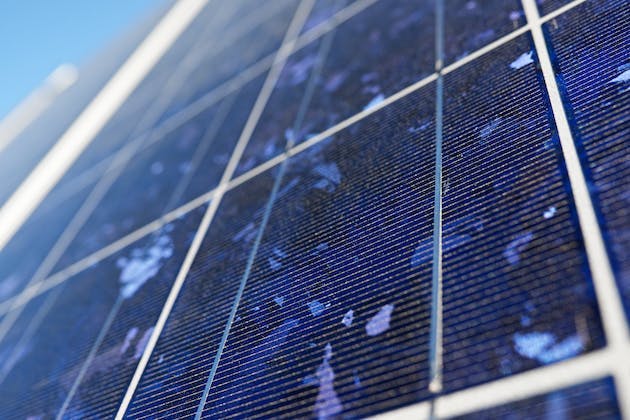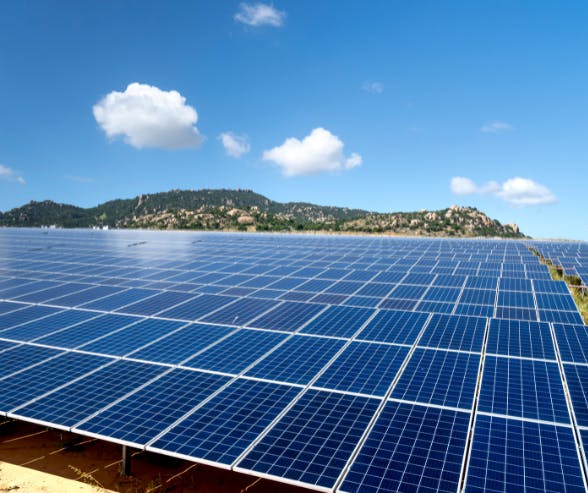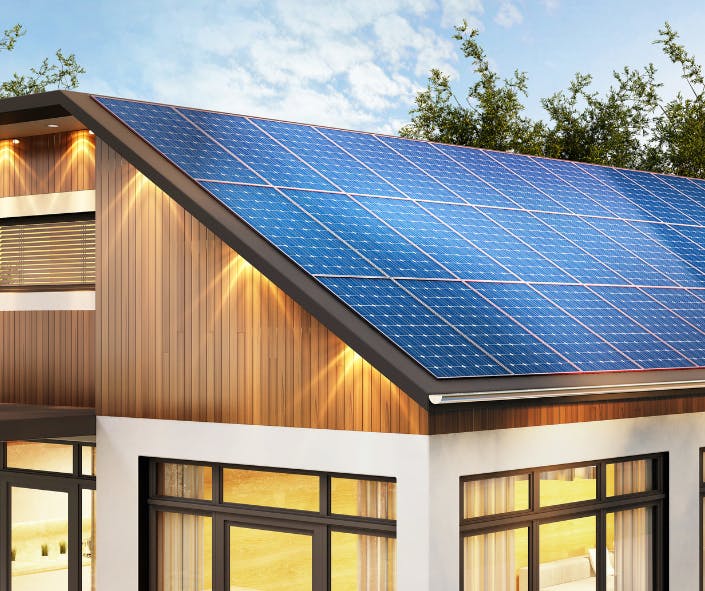Solar panels have become a popular choice over the years, especially because it is always changing and has become a popular choice in many households. Solar thermal panels are for you if you want to heat your home's water using renewable energy, not only can they can drastically reduce your energy expenses.
In this blog, we'll go over the basics of solar thermals and see if it's a good fit for your home.

What are Solar Thermals?
Solar thermal panels absorb the sun's rays to heat domestic water, which may then be utilised to heat your home. Because of this, they significantly lower your energy use and save you money on your monthly heating bills.
How do Solar Thermals Work?
Solar thermal panels are placed on your roof to provide for maximum sun exposure. The water within the panels is then naturally heated before being stored in a hot water cylinder. This allows you to easily use it across your home. Installing solar thermals is relatively easily. The reason for this is that solar panels can be easily added to your existing heating system.
Traditional boilers and heating systems are fully compatible with solar panels and can be used to heat water and collect it making it ideal when solar energy is not available.
Type of Solar Thermals
In the UK, there are 4 main types of solar thermals available, these include:
Active: Pumps are activated by using external electric power
Passive: Rather than using electricity, it relies on the natural transmission of heat from the sun to circulate the hot water.
Direct: The solar panel heats the water directly.
Indirect: The water is heated indirectly by circulating fluid between the solar thermal panels and a heat exchanger.

Benefits of Solar Thermals
Renewable Energy
Solar thermal energy is derived from the sun, which is a clean and sustainable source, reducing reliance on fossil fuels and lowering carbon emissions.
Cost Savings
Solar thermal systems can drastically reduce energy expenditures by utilising free solar heat. As heating expenses continue to climb, this sustainable alternative can provide significant long-term savings.
Environmentally Friendly
Heating engineers contribute to a brighter future by lowering greenhouse gas emissions and combatting climate change by using solar thermals.
Long-Term Investment
Solar thermal systems have a 20-30 year lifespan, making them a long-term investment for homeowners.
Considerations for Installation
Orientation of the Sun
Maximum sun exposure for solar collectors is ensured by optimal solar orientation. Solar thermal installations in the UK are best suited to south-facing roofs with little shadowing.
Roof Load-Bearing Capacity
Although solar thermal systems are lightweight, it is critical to ensure that the roof can withstand the added strain. A structural engineer can help decide whether reinforcements are required.
System Sizing
It is critical to properly size the system based on the household's hot water demand. Over or underestimating the system size can have an impact on its efficiency and overall performance.
Plumbing and Integration
Solar thermal systems necessitate proper plumbing as well as connection with existing heating systems. Collaboration with a competent heating engineer assures a smooth installation process.
Are solar thermals right for my home?
Whether solar thermals are ideal for your home is determined by a number of criteria. Here are a few things to think about when you evaluate their suitability:

Sunlight Availability
To create heat effectively, solar thermals require an adequate amount of sunshine. If your property is excessively shaded or does not receive enough direct sunlight, the system's efficiency may suffer.
Roof Space and Orientation
Solar collectors are often mounted on the roof, thus its orientation must be assessed. In the United Kingdom, south-facing roofs receive the greatest sunlight. You'll also need adequate roof space to accommodate the collectors, taking into account existing vents, chimneys, and shade.
Hot Water Demand
Solar thermal energy is generally utilised to heat water. Assess your household's hot water needs to see if solar thermal systems can meet them. These systems are more likely to assist larger families with high hot water usage.
Financial Considerations
While solar thermal might give long-term cost reductions, you must consider the installation expenses. Examine your budget and evaluate the potential return on investment over the life of the system. It's also worth looking into any financial incentives, such as government subsidies or feed-in tariffs, that may be available to assist cover the early costs.
Existing Heating System
Solar thermal systems can be combined with existing heating systems such as boilers or heat pumps to create a complete heating solution. To ensure seamless integration, evaluate the compatibility of your current system and talk with a heating engineer.
Long-Term Plans
Consider your long-term property goals. If you plan to relocate or make significant changes to your heating needs in the near future, it's critical to assess the feasibility and possible return on investment of installing solar thermals.
It is recommended that you speak with a certified heating engineer who specialises in renewable energy systems before deciding whether solar thermals are suited for your home. They may evaluate your individual situation, do a site study, and make personalised recommendations based on your demands and the viability of solar thermal installation.
What to Consider When Buying Solar Panels
Energy Needs
Determine the size of the solar panel system necessary by assessing your household's energy needs. Consider your average electricity consumption, peak usage hours, and any changes in energy demand in the future.
Available Roof Space and Orientation
Determine whether the available roof space and orientation are acceptable for solar panel installation. In the UK, south-facing roofs receive the greatest sunshine, but east or west-facing roofs might also be feasible solutions. In addition, consider the roof shade caused by surrounding structures, trees, or chimneys, as shading can have a considerable impact on solar panel efficiency.
Quality and Efficiency
Investigate several solar panel brands and models to ensure you select a high-quality and efficient system. Look for panels with a proven track record, certifications (such as MCS in the UK), and warranties. Higher efficiency panels may be more expensive at first, but they can provide more electricity in the long run.
Financial Considerations
Examine the cost implications of solar panel installation. Consider the initial costs, including purchase and installation, and compare them to the potential savings on your energy bills throughout the system's lifetime. Additionally, look into any financial incentives, such as government grants, tax credits, or feed-in tariffs, that may be available to assist offset the initial investment.
Maintenance Requirements
Understand the solar panel maintenance requirements. Although solar panels are very low-maintenance, they may require cleaning and inspection on occasion. Consider your panels' accessibility for maintenance, especially if your roof has a steep pitch or is difficult to access.
Installer Selection
Select a trustworthy and licenced solar panel installer. Investigate client feedback, solicit recommendations, and gather multiple bids to compare costs and services. A skilled installer can assure appropriate installation, system operation, and local regulatory compliance.
Long-Term Plans
Consider your long-term property goals. If you want to stay in your home for a long time, solar panels can give long-term financial benefits. However, if you plan to relocate soon, consider the prospective return.
Book a Solar Panel Installer
Here at Green and Reliable, we are fully trained and qualified to install solar panels across York, Harrogate, Wetherby and Malton. Get in touch with our team by calling us on 0800 118 2467 or 07717 574 470 and we'll be happy to help.


